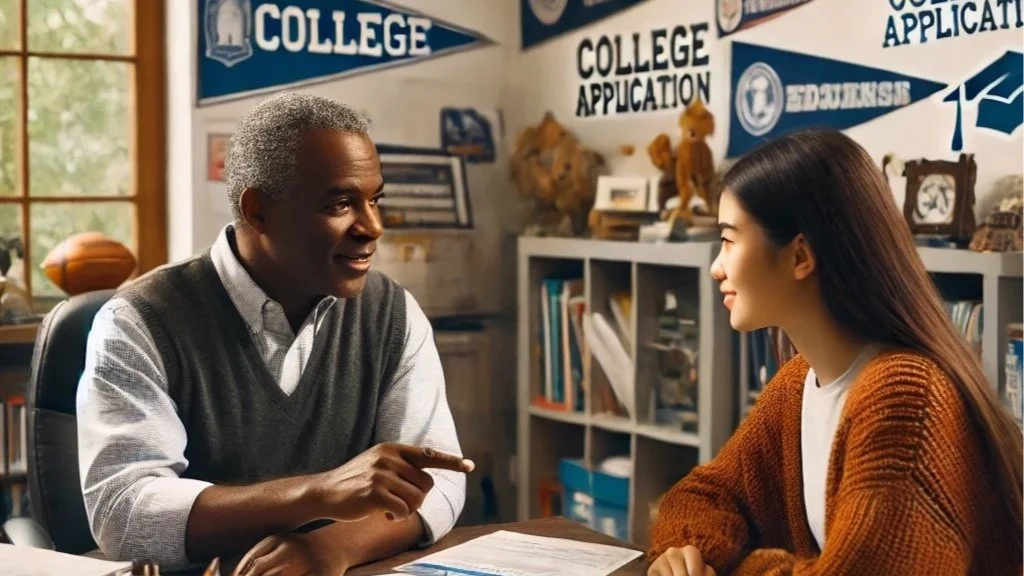Chapter 7: Your One-Stop Guide to Letters of Recommendation
Written by Kaashvi, Dartmouth College
Welcome back to The College Countdown! For those of you who are joining us for the first time today and aren’t familiar with me, hey, I am Kaashvi, your friendly neighborhood college admissions enthusiast and your guide through this series. If you’re a returning reader, I hope that after reading the last article, you’ve been able to get some ideas on where to start with your personal essay. Either way, I am ecstatic that you’ve decided to join us for this wild ride. In this week’s episode, I am taking you through the process of gathering those all-important letters of recommendation.
It’s that time of the year where all rising seniors are thinking about requesting their letters of recommendation. The same things are on every student’s mind going into summer: which teachers should they ask, how do they approach them and what things should they prepare beforehand? It’s easy to stress about whether your favorite teacher will agree to write you a letter or worry that a teacher might secretly write a negative letter that could torpedo your chances of getting into college.
There is a lot of anxiety around this process because this is one element of your application you have very little control over. You won’t know how good the letters were at advocating for you until you receive the dreaded decision notification. But don’t worry, I have been in your position and know exactly how it feels. I also know that there are some small things you can do to obtain the most descriptive letters possible.
But first, what is a letter of recommendation (LoR)? Colleges aren’t looking to admit test scores or numbers, they’re in search of real people with identities of their own. While your essays do most of the heavy lifting in that area, at the end of the day, they are your stories written from your perspective. But your letters of recommendation? They are third-person accounts about you from people who know you the best. They add depth to your application by offering new observations and authenticity by backing up all that you’ve shared. Since admissions officers don’t get the chance to meet most applicants in person, letters from your academic advisors really compliment your application.
Now, let’s break down the different types of LoRs you’ll need to get to complete your application:
The Counselor Letter: This letter comes either from the school guidance counselor or the school principal and speaks to the student’s academic abilities and extracurricular life in context to the school. Like, how does the student fit within the school’s overall demographics, curriculum and test scores? They also address any special or extenuating circumstances outside the school that impact the student. This letter is submitted along with a school profile that helps to contextualize your achievements by telling the admissions officer about all the resources that were available to you at the school.
The Academic Teacher Letters: These letters are submitted by teachers who have taught you during your junior (preferable) and senior years of high school. They talk about the student’s presence in the classroom, quality of the student’s work and how the student thinks. You need two of these letters for most colleges.
The Supplemental Letters: These are additional letters which are usually not mandatory and can come from anyone who is a non-academic mentor like—an employer, a coach, an art teacher, a peer or a religious leader. In places where it’s optional to attach them, you should only do so if the letter adds meaningful information about your candidacy which is not mentioned anywhere else on your application.
From selecting your recommender to submitting that letter, the whole process can be summed up in five simple steps.
1. Selecting Your Recommender(s):
This is one of the two things you have control over when it comes to LoRs. While you don’t get to pick who writes the guidance counselor recommendation for you, you do have complete freedom to select your recommenders for the teacher letters.
You should always pick a teacher that you really connected with and have a relationship with beyond the classroom. You could be a member of the club where they are an advisor or have worked with them on a project—anything that would allow them to speak to your personality and interests beyond simply saying that you’re a good student. My personal recommendation is to get one letter of a teacher in STEM and the other from a teacher in the humanities. But, if one of the schools has a specific requirement, cater to that. Don’t pick a teacher just because you aced their class because then, they wouldn’t have anything to say which hasn’t already been conveyed by your transcripts.
For your supplementary letters, the same advice applies. You want to pick someone who you know will invest time in making your letter personalized, share anecdotes about you that speak to your character and will advocate strongly for you.
A litmus test to make sure you’ve picked the perfect teachers for your recommendations is by asking yourself if they would be surprised after reading your application. If they are already aware of most of the things you’ve written in your application, they probably know you well enough to write a stellar letter. If they're going to be shocked to see how involved you are and how well you write, then it might be better to pick another teacher.
Last note on this. You’ve probably been told to spend your junior year building relationships with your teachers by visiting them at office hours and speaking up in class. But if your efforts aren’t genuine and come from a place of self-interest, it will likely be transparent and hurtful. Forming strong bonds with your teachers is worth it in its own right, but it will also show your teachers you’re not just someone looking to tick off a box on your college application checklist. If they know you, it’ll make it easier for them to write you a letter. In the same breath, you’ll end up with a mentor. So, remember, it’s not
about flattering your teachers, it’s all about being yourself and being invested in the people who are helping you in your journey.
2. Preparing a LoR Packet:
This packet contains a two-page resume, your college list and a few short answers to specific prompts. Your resume should detail all of your extracurricular activities, work experiences, community service and internships. It should also mention your academic stats like GPA, rank and test scores and a brief summary of all the classes you’ve taken—AP, IB, Honors, Dual Enrolment etc. Feel free to add a heading where you can note down all of your hobbies and personal projects like reading, baking, small-business or speedcubing.
I would suggest highlighting all the things you definitely want your recommender to include in the letter and adding more details about your impact from that extracurricular activity in your resume.
This isn’t absolutely necessary, but if done well, it can make your letter very personalized; answer a couple short prompts about yourself and include it in your LoR packet. You could talk about the theme and arc of your application, some qualities about yourself, why you like that teacher’s class, moments you specifically remember from the class or challenges you’ve faced and overcome. The world’s your oyster with this one; the more information you provide, the more options your recommender has to choose from.
3. Requesting the Recommendation(s):
Now comes the part which can be a little awkward and because of this, a lot of students end up procrastinating on it. Don’t worry, I was in the same place as you when I was applying as well. The best time to request your letters is toward the end of junior year. This is when your relationship with your teacher is at its peak—all of your contributions in class are fresh in their mind and they can easily recall anecdotes and other great things to write about you. Being the first one to approach a teacher shows your initiative and guarantees a thoughtfully written letter.
Now that you know when you have to request your letter, let’s address the how. Catching your teachers after class or stopping by during office hours is the most appropriate way to bring this up. Prepare an elevator pitch and give your recommender a quick rundown of why you want them to write your letter out of all the other teachers who have taught you. This could include anything from something you liked about their class to something about their teaching style that appealed to you. Then, hand them the LoR packet you’ve prepared and give them a timeline of when you’d need the letter and evaluation to be submitted.
I would also suggest telling them about the total number of schools and scholarships you intend to use their LoR for so they can prepare accordingly. If they have any doubts about the submission process, take the time to walk them through it. Try to do everything you can to lessen your teachers’ burden because they already have so much on their plate. This will not only show that you’re taking responsibility for the process, but also ensure that all of your letters are turned in on time.
Here’s what your conversation might look like: “Hey Ms. Green, I’ve had a great time in your class this past year and it’s now one of the main reasons why I want to major in Biology at Johns Hopkins. I especially loved the unit on genetics, particularly the lab we did on DNA extraction. Your interactive way of teaching made the entire course a highlight of my junior year. Would you be willing to write a letter of recommendation for my college application?”
“That’s amazing, thank you so much! Here’s the packet with my resume for your reference. I will email you a copy of the same as well. Just a heads up, I’m planning to apply to nine colleges and a couple scholarships as well, where I’ll need you to submit the letter as well in the coming months. If you have any questions, please feel free to reach out to me. I’m so thankful that you’ve agreed to do this!”
4. Following Up and Following Through:
Make sure you notify and remind your recommender about approaching deadlines at least a week in advance. If you see any letters missing on your portal, be proactive and reach out to your teacher about getting it turned in at the earliest.
5. Submitting the recommendation:
After you’ve decided on your recommenders, you need to read through the FERPA rules and make a call to waive them or not. If you choose to waive your FERPA rights, you cannot ask to read your LoRs once you’ve been admitted to college. I recommend that you waive these rights because it shows that your teachers were able to write the letters without feeling pressured. It also seems more honest to the admissions committee because by waiving these rights, you signal that you trust your teachers.
You can add your recommenders on the Common App and send them an invite link to submit their recommendations. For schools like Georgetown and MIT that have their own applicant portals, your teachers will have to upload their recommendations separately.
6. Thank-You Letters:
The last step is one most students forget; say thank you. Writing a descriptive letter for each of the twenty students they teach is time consuming and needs a lot of thought. Every teacher who spends time out of their schedules to help your candidacy at your dream school deserves a thank you note. There’s no need to break the bank—anything from a heartfelt hand-written note to a small plant is great. Your gift can be hand delivered either midway through your application process or after you’ve started receiving your acceptances.
Great recommendation letters fit the theme of your application, are detailed, use superlatives (contextualize), don’t follow a template and paint a vivid picture. I know this is a lot of effort and it’s natural to question if it’s even worth it to do everything I’ve just listed. It can be tricky to predict how colleges weigh the letters of recommendation. Some schools like Yale are very open about how crucial the LoRs are to the decision-making process on your application. Other schools like Princeton can be a bit more cryptic on the topic. All in all, a well-worded, personalized letter coming from someone who can gush about you for two pages straight and
strongly pushes for your admission will do nothing but help your chances. So, take a deep breath and put yourself out there. I promise you, you will have absolutely no regrets looking back for giving the process your absolute best shot. After all, you only get to do this once.
Thank you so much for joining me today and if you’ve made it to the end, great job on coming one step closer to your dream. Stay tuned for the next article in the series where we will be weighing out the pros and cons of each, the SAT and the ACT. Until next time, keep dreaming big!
ABOUT THE AUTHOR
Hey there, college-bound crew! I’m Kaashvi, an undergraduate student at Dartmouth College from India. I’m the brains (and heart) behind the College Countdown series here at The Ivy Institute and I am stoked to be your guide through this process.
So, a little bit about me: I was a STEM kid through and through in high school and all my classes were the highest level ones offered at my school and graduated at the top of my class for three consecutive years. Outside of class, I was involved in activities that let me nurture my love for inventiveness, responsibility and storytelling. From designing a vehicle to aid oil spill cleanup to working as an elected representative for the youth advisory council to volunteering at the local deaf school—I devoted a lot of my time to projects that were true to my values.
When I’m not typing away at my keyboard, dishing out college advice to people in my inbox and on this blog, you can catch me exploring new hiking trails, whipping up some questionable (but oddly delicious) desserts at my bakery or getting lost in a gripping mystery novel.
As an international student, the application process wasn’t just about finding a spot at a prestigious university but also about finding a place that felt like a second home. Now that I’ve made it out alive to the other end (with a boatload of stories to tell), I'm here to spill all the tea on how you can do the same. With some guidance and a whole lot of oversharing, together we’ll crush this admissions game like absolute pros.
Catch you on the flip side,
Kaashvi








